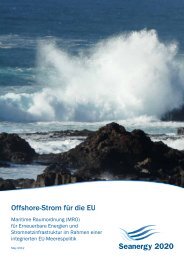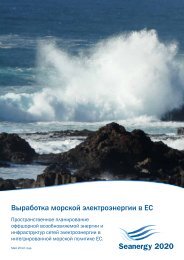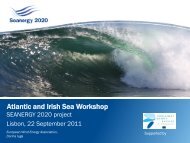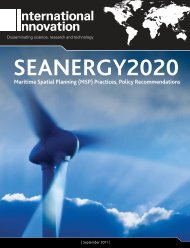Comparative analysis of Maritime Spatial Planning ... - Seanergy 2020
Comparative analysis of Maritime Spatial Planning ... - Seanergy 2020
Comparative analysis of Maritime Spatial Planning ... - Seanergy 2020
Create successful ePaper yourself
Turn your PDF publications into a flip-book with our unique Google optimized e-Paper software.
5.3.3 Policy recommendations• Establish in all Baltic countries a legal obligation to organise stakeholder consultation, prior tothe establishment <strong>of</strong> MSP policy as well as when ORE projects are submitted (the Swedishpractice could be used as a model).• Enhance the interest <strong>of</strong> the public for <strong>of</strong>fshore renewable energy by promoting an activestakeholder participation in the consultation process (see Poland).5.4 SECTOR CONFLICT MANAGEMENT5.4.1 Barriers and obstaclesIn Sweden, some maritime sectors like fishing, shipping and defence seem to have a dominantposition in sector conflicts. This is <strong>of</strong>ten not the best possible starting point for fair sector conflictmanagement in maritime areas. Most <strong>of</strong> the sector conflicts in the Baltic Sea basin are managed ona case-by-case basis and are addressed during the EIA process.5.4.2 Good practicesPoland addresses possible sector conflicts in a preventive way by actively involving a maximum <strong>of</strong>stakeholders at the earliest possible stage <strong>of</strong> the MSP process, as illustrated during the test MSP inthe Gulf <strong>of</strong> Gdansk. Denmark is one <strong>of</strong> the only countries where compensation measures forcommercial fishing are expected. The involvement <strong>of</strong> the maritime stakeholders in the drafting <strong>of</strong> anMSP and the designation <strong>of</strong> the ORE zones in Germany has mitigated the risk <strong>of</strong> sector conflicts.5.4.3 Policy recommendations• Create a level playing field in order to best prevent sector conflicts in MSP policy. Every maritimesector should, in principle, have equal rights to claim some parts <strong>of</strong> the maritime space for itsactivity, be it defence, fishing, or <strong>of</strong>fshore renewable energy.• Engage in early discussions with the maritime sectors that cannot displace their activities: allrelevant sectors should be involved from the beginning <strong>of</strong> the MSP process to help shape anMSP that enables the safe and conflict free co-existence <strong>of</strong> „old‟ and „new‟ users <strong>of</strong> the sea. ThePolish pilot MSP in the field <strong>of</strong> sector conflict management (Gulf <strong>of</strong> Gdansk) could bedisseminated to other Baltic coastal states.5.5 DATA AND INFORMATION MANAGEMENT5.5.1 Barriers and obstaclesThe majority <strong>of</strong> Baltic countries dispose <strong>of</strong> maritime data and information related to geology, windstatistics, measurements in the air and water, marine biodiversity, socio-economic activities, andothers. The information is not available in GIS format in most Baltic countries which may hamper thecentralisation and inter-operability <strong>of</strong> the data and information for the purpose <strong>of</strong> preparing MSPs.Deliverable D 2.389 | P a g e






